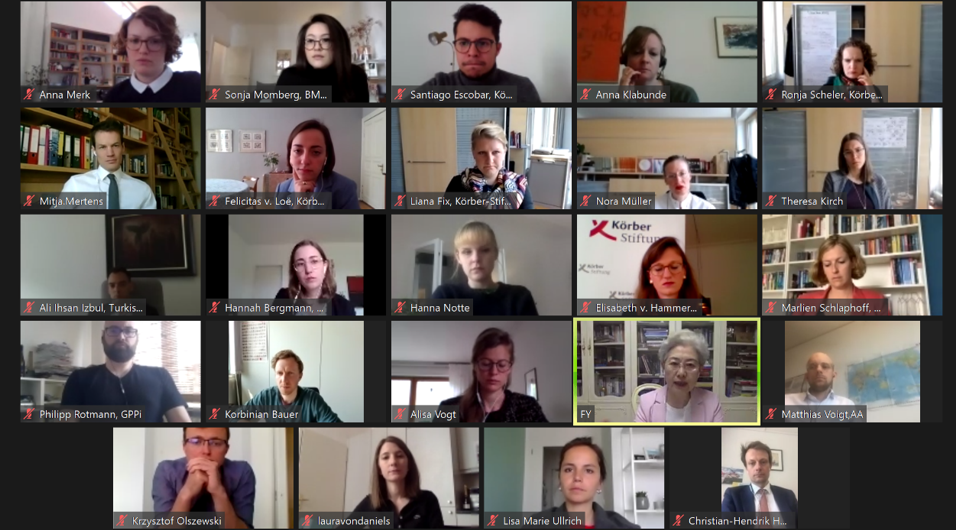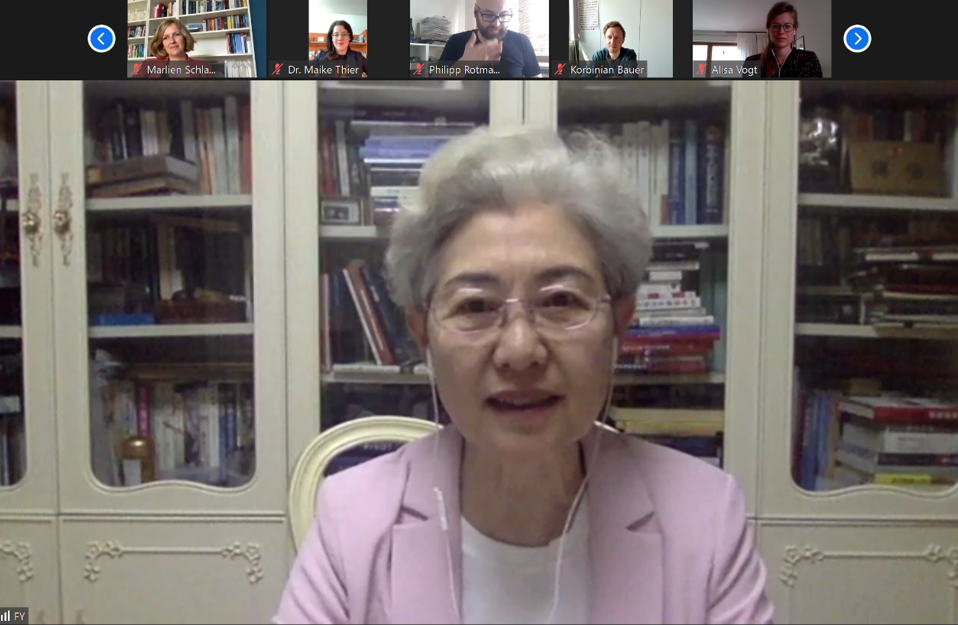

On May 14, 2020, the Körber Foundation in Germany held a digital background discussion themed " Europe in the Face of US - China Rivalry". Mme. Fu Ying, Chairperson of Center for International Security and Strategy at Tsinghua University (CISS), was invited to the discussion as a keynote speaker. The attendees also included 29 senior officials and think tank scholars in Berlin’s foreign policy community.
In her speech, Fu Ying said that the fight against the Covid-19 pandemic is a strenuous battle between humankind and an invisible enemy to protect lives. No country can fight this battle alone. It is the universal appeal of the international community to fight it through global cooperation in its truest sense. China has worked closely with many countries in this battle against the outbreak.
Fu Ying analyzed the reasons for the deterioration in the China-US relations and the escalation of tensions between the two. She believes that the American hawks do not wish to see their strategic rivalry with China disrupted by China-US cooperation to combat the pandemic, and are striving to escalate the competition through a smear campaign against China. Facing an election amid a pandemic, overlaid with the "China issue", both the Republicans and Democrats see China as a target in their political battleground, creating a poisonous atmosphere between China and America.
Fu Ying said that the China-US relations are drifting away from the relatively reasonable prospect of "competitive cooperation" where there is limited and controllable competition with cooperation in multiple fields. Instead, they are getting closer to the prospect of vicious confrontations and even conflicts. Both sides need to take actions as soon as possible to control the relations and strive to bring them back to what was based on stability, coordination, and cooperation as proposed by President Xi Jinping, and cannot allow the ongoing trend to advance.
Fu Ying stated that it is crucial whether the two countries can resolve their differences within the existing international structure. Europe and the rest of the world are disinclined to have to take sides in the China-US confrontation. China and Europe could let go of their political prejudices in trade, reform and other fields, heed professional opinions, and actively promote cooperation. As an ally of the United States and a trading partner of China, Europe can make efforts to avoid a decoupling of China and the US and help them get out of the current stalemate and deterioration in relations.
Regarding global cooperation against the pandemic, Fu Ying believes that China, America, and Europe all need to expand the scale of information sharing and exchange of experience on the basis of trust, to jointly support developing countries in their prevention and combat against the outbreak and stem its spread to a larger scale, as well as to cooperate in R&D, production, and distribution of vaccines and treatments as soon as possible, and the outcomes shall be made open-source and shared globally.
After the speech, Fu Ying exchanged views with the scholars and officials present and answered related questions. The key questions raised by the German panel include: Will the pandemic emerge as an opportunity for multilateral cooperation? Does China categorically support global cooperation? Concerning current vaccine research and development, will China become the first country to share such knowledge as open-source information or make relevant political commitments? What is the biggest lesson for the world from this pandemic? Fu Ying reiterated China's positive attitude towards multilateralism and cooperation between countries, emphasizing that China has benefited from a globalized and peaceful external environment and has no motive for creating confrontation and conflict. In terms of the R&D of a vaccine, Fu Ying stated that professionals should be able to play their roles and political hostility shall not be allowed to obstruct cooperation among scientists. Looking back on this outbreak, Fu Ying pointed out that what is needed afterwards are rigorous scientific research, health education, and a more agile and faster response to infectious diseases.
The Körber Foundation is an independent think tank, established in 1959 by German entrepreneur and philanthropist Kurt A. Körber. It is dedicated to serving the public interest and focuses on areas including international dialogue, scientific innovation, education and more. The Körber Foundation has continued to make efforts and contribution in forging mutual understanding between China and Europe. President Xi Jinping was invited by the foundation to deliver an important speech in Berlin in March 2014.
The Berlin Foreign Policy Forum was jointly established by the Körber Foundation and the German Federal Foreign Office. The annual gathering convenes around 250 high-ranking politicians, government representatives, scholars and journalists to discuss core foreign policy issues for Germany and Europe, and to provide policy options for the government. In December 2017, Fu Ying was invited to the forum and participated in the debate Northeast Asia on the Brink? The North Korea Nuclear Crisis.
